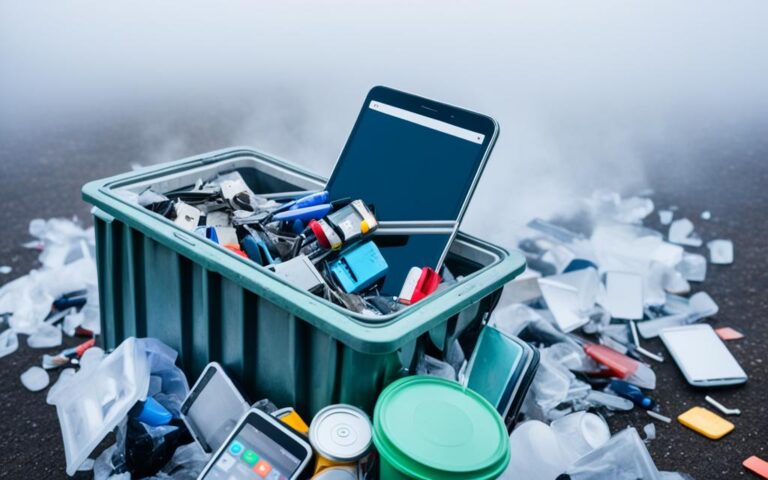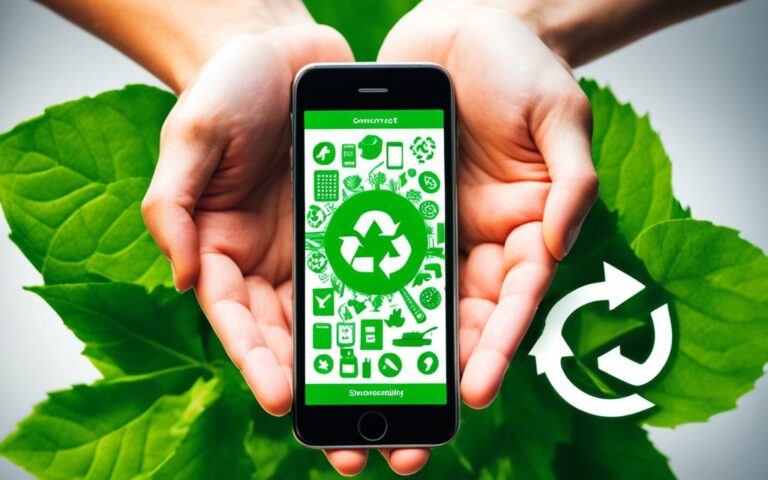The Hidden Hazards of Improper Phone Disposal
Proper phone disposal is essential to prevent Phone Disposal Hazards and protect against the risks associated with Improper Phone Disposal. In today’s digital age, our phones contain a plethora of personal information, including sensitive data that can be exploited by data thieves.
Statistics reveal that a shocking 1 in 4 devices processed for recycling are accessed by data thieves, underscoring the need for caution when disposing of old phones. Failing to take necessary precautions can result in data theft, compromising our privacy and leaving us vulnerable to identity theft.
Not only that, but improper phone disposal can also lead to health risks. Prolonged exposure to the radiofrequency energy emitted by mobile phones has been linked to an increased risk of brain cancer and other health problems. It is crucial to prioritize our well-being by taking the necessary steps for safe phone disposal.
Improperly recycling cell phones can also have severe environmental consequences. These devices contain toxic chemicals and metals such as lead, mercury, cadmium, and arsenic. When not disposed of properly, they can contaminate the environment, polluting the air, water, and soil. By neglecting proper phone disposal, we contribute to environmental degradation and the waste of valuable resources.
It is time to be proactive and responsible when disposing of our old phones. By following safe phone disposal practices and partnering with reputable recycling services, we can prevent data theft, protect against health hazards, and contribute to a healthier environment.
Data Security Risks of Improper Phone Disposal
Improperly disposing of your old phone without taking the necessary precautions can result in serious data security risks. When devices are not properly wiped of personal data and accounts before disposal, malicious individuals can recover this information, putting your privacy at risk. Personal and sensitive information such as banking statements, passport copies, and credit card information can be obtained by data thieves, leading to identity theft and financial implications for the victim.
It is crucial to restore your phone to its default factory settings and remove any SD cards before recycling it to protect your data.
Avoiding Data Security Risks: Best Practices
Protecting your personal information when disposing of your phone requires following a set of best practices:
- Back up your data: Before recycling your phone, ensure you have backed up all important data. This will allow you to transfer it to your new device and minimize the risk of losing valuable information.
- Factory reset: Reset your phone to its default factory settings to erase all personal data and accounts. This will significantly reduce the potential for data recovery by unauthorized individuals.
- Remove SD cards: Remove any SD cards from your phone before recycling it. SD cards may contain personal data that could be accessed if not properly safeguarded.
- Research reputable recycling services: Choose recycling services that prioritize data security and offer secure data wiping processes. Ensure they comply with relevant data protection regulations.
- Consider professional data wiping: If you are unsure about securely erasing your data, consider engaging professionals who specialize in data wiping to ensure your personal information is permanently removed from the device.
By implementing these practices, you can reduce the risk of data breaches and protect your personal information from falling into the wrong hands. Remember, taking the time to safeguard your data during phone disposal is a crucial step in maintaining your privacy and preventing potential identity theft.
Environmental Hazards of Improper Phone Disposal
Improper disposal of cell phones can have significant environmental hazards. Electronic devices contain toxic chemicals and metals such as lead, mercury, cadmium, and arsenic, which can contaminate the environment if not disposed of properly. This contamination can lead to pollution of air, water, and soil, posing a threat to ecosystems and human health.
Additionally, improper disposal results in a waste of valuable resources that could be reused or recycled, contributing to environmental degradation and increased demand for raw materials. Improper disposal of lithium-ion batteries also increases the risk of dangerous fires and explosions.
Proper disposal of cell phones is crucial to mitigate these environmental hazards and promote a sustainable future. By recycling and responsibly disposing of electronic devices, we can prevent the release of toxic substances into our environment and conserve valuable resources.
Take a look at the following table to understand the environmental impact of improper phone disposal:
| Environmental Hazards of Improper Phone Disposal | Consequences |
|---|---|
| Contamination of air, water, and soil | Pollution of ecosystems and human health |
| Waste of valuable resources | Environmental degradation and increased raw material demand |
| Risk of fires and explosions | Endangerment to human safety and property |
It is crucial that individuals, businesses, and governments take active measures to address these hazards and adopt sustainable practices for phone disposal. By choosing responsible phone recycling programs, we can protect our environment, conserve resources, and create a healthier future for generations to come.
Safe Phone Disposal Practices
When it comes to safe phone disposal, following the right practices is crucial to protect your data and the environment. By taking a few simple steps, you can ensure that your old phone is recycled responsibly. Here are some guidelines to follow:
- Back up your data: Before recycling your phone, make sure to back up all important data. This will ensure that you don’t lose any valuable information that you might need in the future.
- Erase personal data: Thoroughly erase all personal data and accounts from the device to prevent data theft. Resetting your phone to its factory settings is the best way to ensure that your personal information is completely removed.
- Remove SIM card, memory card, and battery: Before recycling, it’s important to remove the SIM card, memory card, and battery from your phone. These components can contain personal information and should be disposed of separately.
It is safe to recycle an iPhone, and many companies offer services for safe iPhone recycling. However, it’s important to check local regulations and recycling centers that accept electronics to ensure proper disposal. Remember, throwing away old phones can have serious consequences for the environment.
Proper phone recycling practices not only protect your data but also contribute to a sustainable future. Be responsible and choose safe phone disposal methods that prioritize data security and environmental conservation.
Safe Phone Disposal Checklist
| Steps for Safe Phone Disposal |
|---|
| Back up all important data |
| Thoroughly erase personal data and accounts |
| Remove SIM card, memory card, and battery |
| Check local regulations and recycling centers |
Conclusion
Proper phone disposal is essential to prevent data theft, protect against radiation exposure, and avoid environmental contamination. By following safe phone disposal practices such as backing up data, erasing personal information, and removing removable parts, individuals can ensure the safe recycling of their old phones.
Recycling electronic devices not only prevents them from ending up in landfills but also conserves valuable resources. When we recycle our phones, we contribute to reducing electronic waste and minimizing the harmful impact on our planet.
Taking steps towards responsible and sustainable phone disposal is crucial for a healthier environment and a safer digital future. Let’s be mindful of the impact of our electronic devices and make conscious choices. Partnering with reputable recycling services, such as S2S Group, can further promote ethical and sustainable practices in the corporate world.
FAQ
What are the hazards of improper phone disposal?
Improper phone disposal can lead to hidden hazards such as data theft, radiation exposure, and environmental contamination. When not disposed of properly, 1 in 4 devices processed for recycling are accessed by data thieves. Long-term exposure to the radiofrequency energy emitted by mobile phones has been linked to an increased risk of brain cancer and other health problems. Additionally, improper recycling can contaminate the environment with toxic chemicals and metals, pollute air and water, and waste valuable resources.
What are the data security risks of improper phone disposal?
Improperly disposing of your old phone without taking necessary precautions can result in serious data security risks. Malicious individuals can recover personal data and accounts that have not been properly wiped, putting your privacy at risk. Data thieves can obtain personal and sensitive information such as banking statements, passport copies, and credit card information, leading to identity theft and financial implications. To protect your data, it is crucial to restore your phone to its default factory settings, remove any SD cards, and properly erase all personal data and accounts before recycling.
What are the environmental hazards of improper phone disposal?
Improper disposal of cell phones can have significant environmental hazards. Electronic devices contain toxic chemicals and metals such as lead, mercury, cadmium, and arsenic, which can contaminate the environment if not disposed of properly. This contamination can lead to pollution of air, water, and soil, posing a threat to ecosystems and human health. Additionally, improper disposal results in a waste of valuable resources that could be reused or recycled, contributing to environmental degradation and increased demand for raw materials. Improper disposal of lithium-ion batteries also increases the risk of dangerous fires and explosions.
What are the safe phone disposal practices?
To ensure safe phone disposal, it is important to follow several practices. First, back up all important data on your phone before recycling it. Next, thoroughly erase all personal data and accounts from the device to prevent data theft. Removing the SIM card, memory card, and battery is also crucial before recycling. It is safe to recycle an iPhone, and many companies offer services for safe iPhone recycling. However, it is important to check local regulations and recycling centers that accept electronics to ensure proper disposal. Avoid throwing away old phones as they contain hazardous materials and can contaminate the environment.















